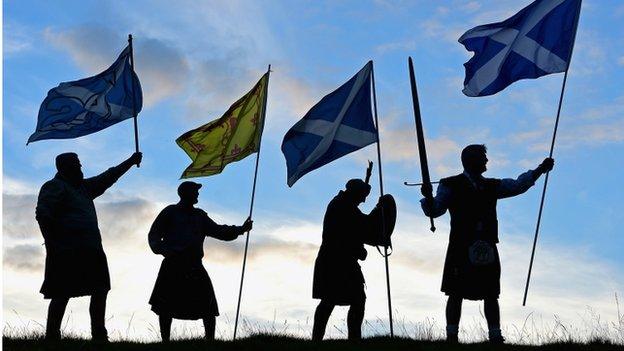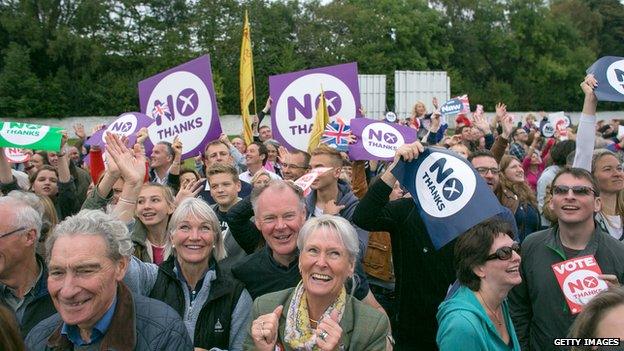Scottish independence: Salmond and Cameron offer rival visions
- Published
- comments
David Cameron: "Independence would not be a trial separation - it would be a painful divorce"
Alex Salmond has joined business leaders to argue for Scottish independence, as David Cameron outlined "head and heart" reasons to vote "No".
Mr Salmond used an event at Edinburgh Airport to hit out at the "scaremongering" of the "No" campaign.
Mr Cameron later gave a speech arguing that independence was a "divorce" rather than a "trial separation".
On Thursday, voters will be asked: "Should Scotland be an independent country?"
Speaking in Aberdeen, the prime minister said the outcome could "end the United Kingdom as we know it", and argued that there would be "no way back" if Scotland does decide to leave the UK.
Elsewhere on the campaign trail...
Gordon Brown is calling for three "guarantees" for Scotland to be "locked in" before voting takes place in the referendum.
Young shipbuilders have penned a letter to First Minister Alex Salmond expressing their "grave concerns" about the future of their industry if Scotland becomes independent.
The Electoral Commission has released the latest information on donations between 22 August and 5 September.
The National Union of Journalists has expressed concern at what it said was an "increase in intimidation and bullying of journalists" covering the independence referendum, and called for people on both sides of the campaign to rein in the abuse being directed at its members.
Peter Strachan, professor of energy policy at Robert Gordon University in Aberdeen, has said he will be voting "Yes" partly because he believes independence will allow Scotland to cut energy bills and tackle fuel poverty.
Richard Branson has expanded on his reasons for last week urging voters to reject independence.
The SNP has welcomed an announcement from Hurricane Energy, external that their appraisal well on the Lancaster field, west of Shetland, could flow twice as much oil as previously expected.
Aviva's chief executive claims the building of key infrastructure such as schools and hospitals could suffer after independence.
Pro-Union supporters and celebrity campaigners, including Sir Bob Geldof and TV historian Dan Snow, gathered for a last minute rally in London's Trafalgar Square urging Scots to stay part of the UK.
He added: "On Friday, people could be living in a different country, with a different place in the world and a different future ahead of it.
"This is a decision that could break up our family of nations and rip Scotland from the rest of the United Kingdom.
"And we must be very clear there is no going back from this, no re-run. This is a once and for all decision. If Scotland votes 'Yes' the UK will split and we will go our separate ways together.
"When people vote on Thursday they are not just voting for themselves but for their children and grandchildren and the generations beyond".
Salmond: Supermarkets see Scotland as an opportunity
Mr Cameron said he understood why many people were planning to vote "Yes", and conceded that the UK was "not a perfect country".
But he added: "I also know that the people who are running the 'Yes' campaign are painting a picture of a Scotland that is better in every way, and they can be good at painting that picture.
"But when something looks too good to be true - that's usually because it is."
In what Downing Street said will be the prime minister's final visit to Scotland before the vote, Mr Cameron also urged voters not to use anger at the coalition government, austerity or the Bedroom Tax as an excuse to vote "Yes".
And he said independence would trigger an "unprecedented" devolution of powers to Scotland.
But Mr Salmond described the referendum as a "once in a lifetime opportunity for Scotland" as he joined a group of prominent pro-independence business people at Edinburgh Airport.

Analysis: Robert Peston, BBC economics editor
So is Deutsche Bank right that Scotland seceding would have a depressive impact comparable to Britain returning to the Gold Standard in 1925 or the US Federal Reserve failing to pump cash into US banks on the eve of the Great Depression?
No, according to senior bankers - whose institutions will have a decisive influence on the immediate economic and financial costs of Scottish separation.
That said, to avoid the worst a number of related important announcements would have to be made by the Treasury, the Bank of England, big banks and Alex Salmond at 7am on Friday morning.
Strikingly, what Salmond says is probably more important than anything else.

The group said they believed a "Yes" vote would allow Scotland to "design an economic and jobs policy for our needs to build a more resilient economy for the future."
The pro-independence business figures included Stagecoach chairman Brian Souter, former William Hill chief executive Ralph Topping, Scottish Enterprise board member Russel Griggs, Klin Group chief executive Marie Macklin and United Wholeslaers chairman Mohammed Ramzan.
In a joint statement, they said: "Scotland has always had the wealth, the talent and the resources.
"We are among the 20 wealthiest countries in the world. But during the last few weeks we've seen something new - a flourishing of national self-confidence. This gives us the strongest of foundations for a newly independent country.
"Downing Street has been orchestrating a relentless storm of scare stories. But while the 'No' campaign talks down Scotland we are determined to focus on opportunity."
They also warned that the rise of Ukip meant there was now the "very real possibility that a 'No' vote could mean an exit from the EU".

Members of the Robert the Bruce Society wave Saltires and and the Royal Standard of Scotland as part of the Scottish independence referendum display in Loch Lomond at the weekend
Mr Salmond used the event to renew his attack on the prime minister, accusing Mr Cameron of scaremongering and bullying businesses into criticising independence.
He said the prime minister had been "caught red handed" encouraging supermarkets to speak out, and described the alleged leaking by the Treasury of details about RBS's future as "a very major scandal".
The first minister also criticised BBC coverage of the referendum campaign, saying there was "real public concern in terms of the nature and balance of coverage".
And he rejected claims of intimidation by the "Yes" side, insisting it had been a "peaceful and joyous campaign".
The bosses of three retail groups put their names to a letter in the Daily Record on Saturday, in which they claimed their costs would rise in an independent Scotland.
They said this result in them having to take "the difficult decision" whether or not to pass those costs on to consumers.

The letter was signed by the heads of Marks and Spencer, B&Q owner Kingfisher and Timpsons.
Footballer David Beckham has also backed the "No" campaign, urging a vote to renew the UK's "historic bond".
But English designer Vivienne Westwood has declared her support for Scottish independence.
With three full days of campaigning left before the vote, politicians on both sides of the debate renewed their efforts to win over undecided voters.
Scottish Deputy First Minister Nicola Sturgeon argued that pensioners should vote for independence to ensure their grandchildren have the opportunities she says were denied to previous generations by years of Conservative governments.
And Labour politicians John Reid, Johann Lamont, Margaret Curran and Anas Sarwar met workers at the BAE Systems shipyard in Glasgow to highlight what they said was the SNP's risk to Scottish jobs in industries such as shipbuilding, the civil service and financial services.
The latest polls suggest the independence vote remains too close to call.
Three polls published at the weekend have put the "No" campaign in the lead, while one has put the pro-independence "Yes" campaign ahead.
The latest poll of polls collating the six most recent surveys, external - carried out between 9 and 12 September and excluding "don't knows" - puts the "No" campaign on 51% and the "Yes" campaign on 49%.